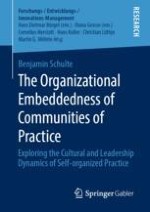This dissertation uncovers how informal and self-organized communities of practice as a source of learning and adaptability are embedded in their formal organizational surroundings. Based on an interpretative case study of three communities of practice within the German Federal Armed Forces, the author theorizes this embeddedness as shaped through cultural dynamics and leadership processes. In particular, the author draws on a practice lens and complexity leadership theory in explaining how communities of practice generate new resources (i.e., adaptability), produce and reproduce broader socio-cultural structures, and are enabled as well as influenced by formal leadership.
